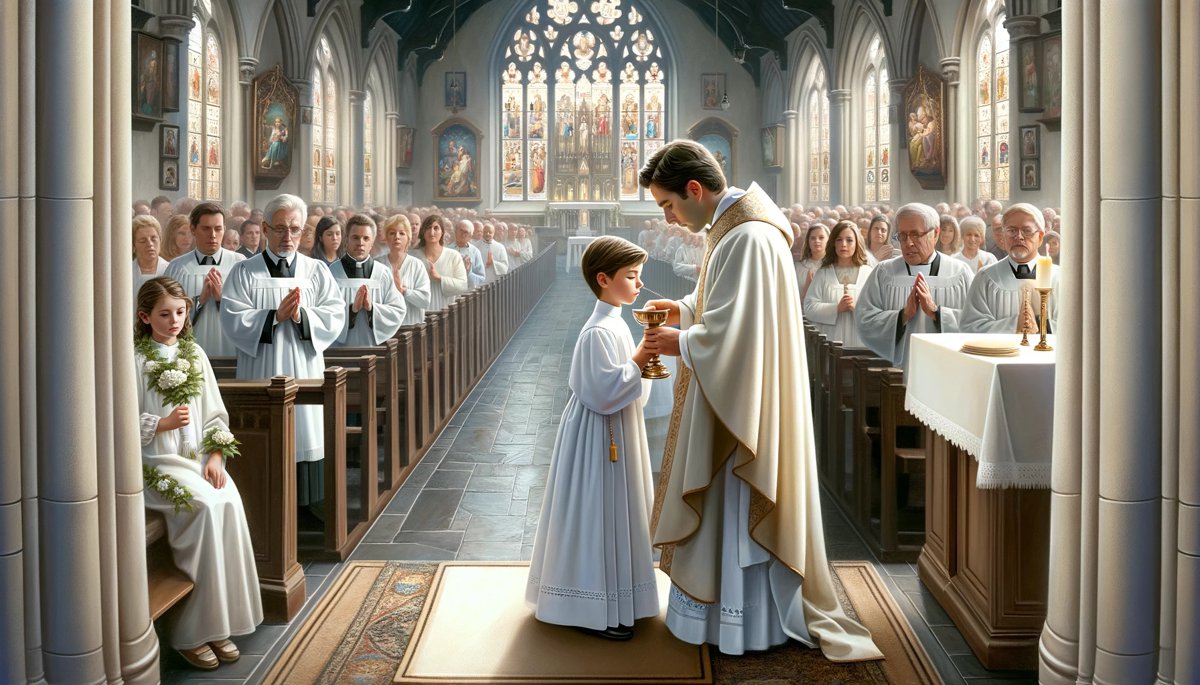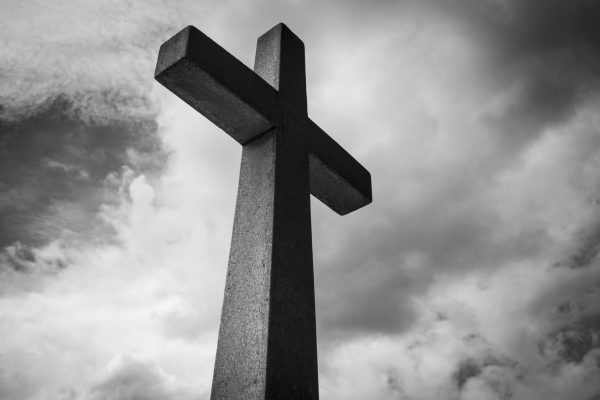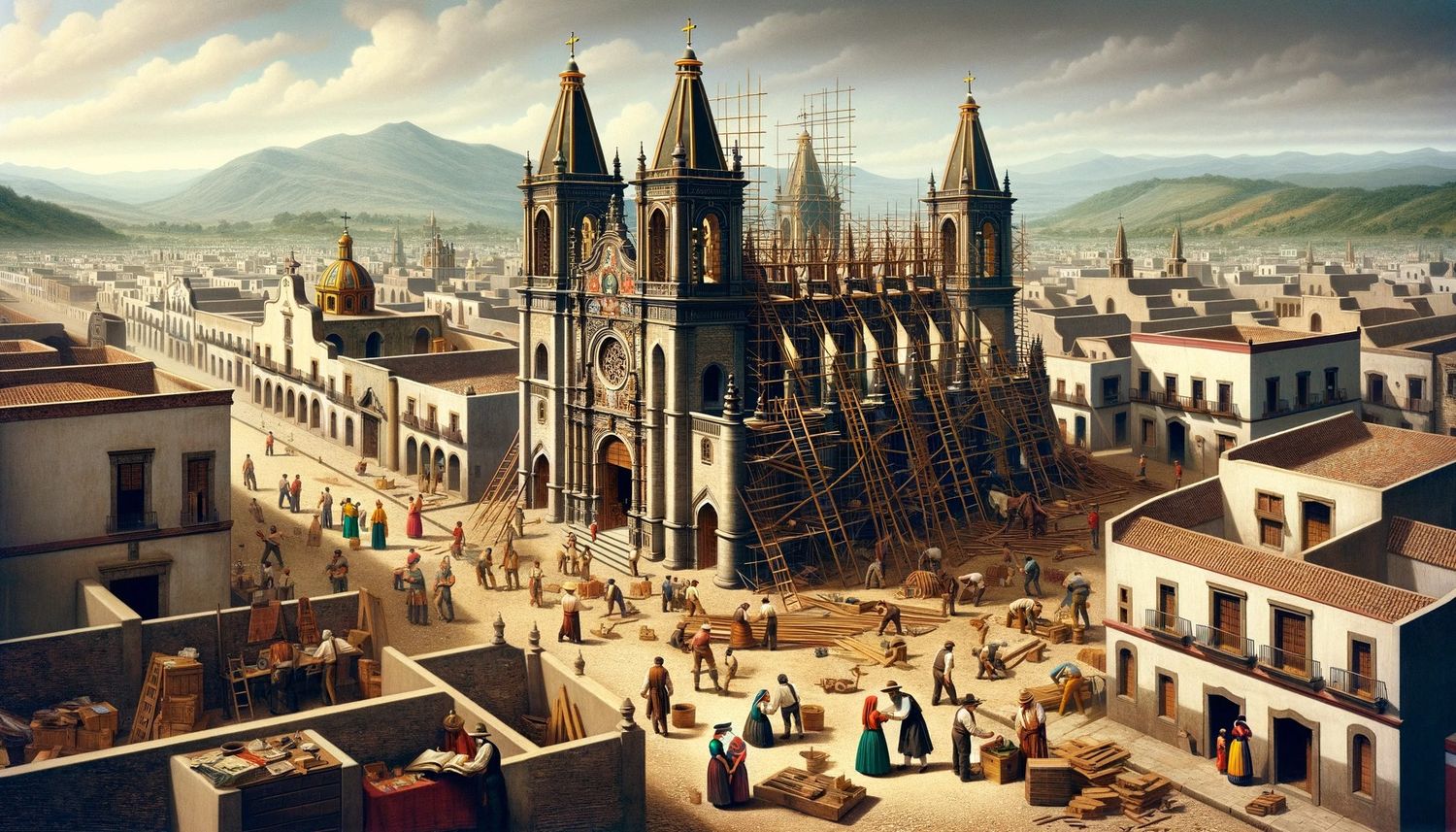Home>Theology and Spirituality>How To Explain Catholicism To A Child


Theology and Spirituality
How To Explain Catholicism To A Child
Published: February 17, 2024
Peter Smith, Editorial Director at Christian.net, combines deep insights into faith, politics, and culture to lead content creation that resonates widely. Awarded for his contributions to religious discourse, he previously headed a major organization for religious communicators, enhancing dialogue on faith's societal impacts.
Discover effective ways to explain Catholicism to a child with our comprehensive guide on theology and spirituality. Engage young minds with age-appropriate teachings and foster a deeper understanding of the faith.
(Many of the links in this article redirect to a specific reviewed product. Your purchase of these products through affiliate links helps to generate commission for Christian.net, at no extra cost. Learn more)
Table of Contents
Introduction
Explaining Catholicism to a child can be a rewarding and enlightening experience. It provides an opportunity to delve into the rich tapestry of beliefs, traditions, and practices that define the Catholic faith. As adults, we often grapple with complex theological concepts, but when it comes to imparting this knowledge to children, simplicity and clarity are key. It's about distilling the essence of Catholicism into digestible nuggets of wisdom that resonate with young minds.
Catholicism is not merely a religion; it's a way of life, a source of comfort, and a wellspring of hope for millions of people around the world. At its core, Catholicism revolves around love, compassion, and the teachings of Jesus Christ. It's about fostering a deep connection with God, nurturing a sense of community, and embracing the values of kindness, forgiveness, and empathy.
In this article, we will explore the fundamental aspects of Catholicism in a manner that is relatable and understandable for children. From the significance of prayer and the role of the Church to the concept of sacraments and the veneration of saints, each topic will be approached with the intention of fostering curiosity and understanding. By presenting the beauty of Catholicism in a way that resonates with young hearts and minds, we aim to lay the groundwork for a lifelong journey of faith and spiritual growth.
As we embark on this exploration, it's important to remember that the goal is not to overwhelm children with theological intricacies, but rather to ignite their curiosity and nurture a sense of wonder about the profound mysteries of the Catholic faith. Through gentle guidance and age-appropriate explanations, we can open the door to a world of faith, love, and spiritual fulfillment, inviting children to embark on a journey of discovery that will enrich their lives in countless ways.
Read more: How To Explain Communion To A Child
What is Catholicism?
Catholicism is a branch of Christianity that traces its origins back to the teachings of Jesus Christ over two thousand years ago. At its core, Catholicism revolves around the belief in one God, who is loving, compassionate, and omnipotent. Central to the Catholic faith is the belief in the Holy Trinity, which comprises God the Father, God the Son (Jesus Christ), and God the Holy Spirit.
Catholics believe that Jesus Christ, the Son of God, came to Earth to teach humanity about love, forgiveness, and salvation. His sacrificial death and resurrection form the cornerstone of the Christian faith, offering the promise of eternal life to those who follow his teachings.
The Catholic Church, led by the Pope and the clergy, serves as the spiritual and administrative center of the faith. It provides guidance, support, and a sense of community for Catholics around the world. The Church is also responsible for preserving and passing down the traditions, rituals, and moral teachings that form the bedrock of Catholicism.
Central to Catholic belief is the recognition of the authority of the Bible, which is considered the inspired word of God. The Bible serves as a guide for moral living, spiritual growth, and understanding the teachings of Jesus Christ. In addition to the Bible, Catholic tradition and the teachings of the Church Fathers also hold significant weight in shaping the faith and practices of Catholics.
Catholicism places a strong emphasis on the sacraments, which are sacred rituals that symbolize and confer the grace of God. These sacraments, including baptism, confirmation, Eucharist, reconciliation, anointing of the sick, holy orders, and matrimony, play a vital role in the spiritual journey of Catholics, marking significant milestones in their relationship with God and the community.
Overall, Catholicism is characterized by its rich traditions, reverence for the saints, devotion to Mary, the mother of Jesus, and a deep commitment to prayer, service, and social justice. It is a faith that seeks to instill love, compassion, and a sense of moral responsibility in its followers, guiding them on a path of spiritual growth and a deeper connection with God.
Beliefs and Practices
Catholicism is founded on a set of core beliefs and practices that shape the daily lives of its followers. At the heart of Catholic faith is the belief in the existence of one God who is loving, merciful, and omnipotent. This belief forms the foundation of a moral and spiritual framework that guides the actions and decisions of Catholics.
Central to Catholic beliefs is the concept of love, compassion, and forgiveness, as exemplified by the teachings of Jesus Christ. Catholics are called to emulate the love and kindness demonstrated by Jesus, treating others with empathy and understanding. This principle underpins the ethical code of conduct that governs their interactions with others and informs their approach to moral dilemmas.
Prayer is a cornerstone of Catholic practice, serving as a means of communication with God and a source of spiritual nourishment. Catholics engage in various forms of prayer, including reciting traditional prayers, such as the Our Father and the Hail Mary, as well as engaging in personal, heartfelt conversations with God. Through prayer, Catholics seek guidance, express gratitude, and find solace in times of joy and adversity.
The sacraments hold profound significance in Catholicism, representing sacred rituals that mark significant milestones in the spiritual journey of believers. From the sacrament of baptism, which welcomes individuals into the Christian community, to the sacrament of matrimony, which unites couples in holy matrimony, each sacrament symbolizes the grace of God and the communal bond shared by Catholics.
The veneration of saints and the Virgin Mary is another distinctive aspect of Catholic belief and practice. Saints, revered for their exemplary lives and devotion to God, serve as inspirational figures for Catholics, offering guidance and intercession in times of need. Similarly, Mary, as the mother of Jesus, holds a revered position in Catholic devotion, symbolizing purity, maternal care, and unwavering faith.
Catholicism also emphasizes the importance of moral living, social justice, and charitable acts. Catholics are encouraged to uphold ethical principles, advocate for the marginalized, and extend a helping hand to those in need. This commitment to social responsibility reflects the belief in the inherent dignity of every individual and the obligation to work towards a more just and compassionate society.
In essence, the beliefs and practices of Catholicism encompass a rich tapestry of spiritual devotion, moral guidance, and communal solidarity. They form the bedrock of a faith that seeks to instill love, compassion, and a sense of moral responsibility in its followers, guiding them on a path of spiritual growth and a deeper connection with God.
The Importance of Prayer
Prayer is a cornerstone of Catholic practice, serving as a vital means of communication with God and a source of spiritual nourishment. It holds profound significance in the lives of Catholics, offering a pathway to deepen their relationship with the divine and seek solace, guidance, and strength in their daily lives.
At its essence, prayer is a form of dialogue with God, a sacred communion that allows individuals to express their innermost thoughts, emotions, and desires. Through prayer, Catholics articulate their gratitude for blessings, seek forgiveness for shortcomings, and present their hopes and anxieties before the loving presence of God. It serves as a conduit for fostering a deep sense of connection with the divine, nurturing a profound awareness of God's presence in their lives.
Prayer takes various forms within the Catholic tradition, encompassing both communal and personal expressions. The communal aspect of prayer is evident in the liturgical gatherings of the Church, where believers come together to participate in shared rituals, hymns, and supplications. These communal prayers reinforce the sense of unity and solidarity among the faithful, fostering a collective consciousness of devotion and worship.
Equally significant is the practice of personal prayer, which allows individuals to engage in intimate conversations with God. Through personal prayer, Catholics find a space for introspection, self-examination, and spiritual renewal. It provides an opportunity for individuals to lay bare their joys, sorrows, and aspirations before the divine, seeking comfort and reassurance in the unwavering love of God.
The act of prayer transcends the boundaries of time and space, offering a timeless channel through which individuals can seek divine intervention, guidance, and healing. In moments of joy, prayer becomes a celebration of gratitude, a heartfelt expression of thanksgiving for the blessings bestowed upon them. In times of adversity, prayer becomes a source of solace, fortitude, and hope, enabling individuals to find strength in the midst of challenges and uncertainties.
Moreover, prayer serves as a transformative force, shaping the inner landscape of individuals and fostering a spirit of compassion, empathy, and understanding. Through prayer, Catholics cultivate virtues of patience, forgiveness, and resilience, nurturing a disposition of kindness and benevolence towards others.
In essence, the importance of prayer in Catholicism cannot be overstated. It is a sacred practice that sustains the spiritual vitality of believers, fostering a deep sense of communion with God and nurturing a resilient faith that transcends the trials and triumphs of life. Through the timeless act of prayer, Catholics find solace, strength, and a profound connection with the divine, enriching their lives with a sense of purpose, hope, and spiritual fulfillment.
The Role of the Church
The Catholic Church plays a pivotal role in the lives of its followers, serving as a spiritual anchor, a source of guidance, and a nurturing community for believers. At its core, the Church embodies the teachings and legacy of Jesus Christ, providing a framework for worship, moral guidance, and communal support.
One of the central functions of the Church is to facilitate the spiritual growth and nourishment of its members. Through the celebration of the Eucharist, the sacrament of the body and blood of Christ, Catholics partake in a sacred ritual that symbolizes their unity with God and with one another. The Church serves as the sacred space where believers gather to participate in this profound act of worship, fostering a sense of communion and spiritual renewal.
In addition to providing a platform for communal worship, the Church offers a wealth of spiritual resources and guidance to its members. Through the ministry of priests, deacons, and religious leaders, the Church provides pastoral care, spiritual counseling, and sacramental support to individuals and families. It serves as a beacon of hope and solace, offering a refuge for those in need of spiritual nourishment and guidance.
Furthermore, the Church plays a vital role in upholding moral and ethical principles, advocating for social justice, and promoting charitable acts. It stands as a moral compass, guiding its members to uphold values of compassion, justice, and solidarity with the marginalized and vulnerable. Through its teachings and advocacy, the Church inspires its followers to actively engage in acts of kindness, generosity, and social responsibility, thereby contributing to the betterment of society.
The Church also serves as a custodian of tradition, preserving the rich tapestry of Catholic rituals, customs, and teachings that have been passed down through generations. It upholds the sacred heritage of the faith, ensuring that its timeless wisdom and spiritual practices continue to inspire and guide believers in their journey of faith.
Ultimately, the Church is more than a physical structure; it is a living, breathing embodiment of the teachings of Jesus Christ, a nurturing community of faith, and a beacon of hope for millions of Catholics around the world. Its role in providing spiritual nourishment, moral guidance, and communal support underscores its profound significance in the lives of believers, shaping their spiritual journey and fostering a deep sense of connection with God and the global Catholic community.
Read more: How To Explain Advent To Kids
Explaining the Sacraments
The sacraments hold profound significance within the Catholic faith, serving as sacred rituals that mark significant milestones in the spiritual journey of believers. These rituals, instituted by Jesus Christ, symbolize and confer the grace of God, fostering a deep sense of spiritual communion and unity within the Catholic community.
The sacraments are visible signs of the invisible reality of God's grace at work in the lives of believers. They serve as channels through which individuals encounter the transformative power of God's love and mercy, guiding them through key moments in their spiritual development.
The sacraments are divided into three categories: the sacraments of initiation, the sacraments of healing, and the sacraments of service. The sacraments of initiation, including baptism, confirmation, and the Eucharist, mark the foundational steps in a Catholic's journey of faith. Baptism welcomes individuals into the Christian community, cleansing them of original sin and initiating them into the life of Christ. Confirmation strengthens the bond with the Holy Spirit, empowering individuals to embrace their faith with courage and conviction. The Eucharist, also known as Holy Communion, nourishes the faithful with the body and blood of Christ, fostering a deep sense of spiritual sustenance and unity with the Church.
The sacraments of healing, namely reconciliation and the anointing of the sick, offer solace and restoration to those in need. Reconciliation provides the opportunity for individuals to seek forgiveness for their sins, experiencing the liberating grace of God's mercy. The anointing of the sick brings comfort and spiritual strength to those facing illness or adversity, offering the assurance of God's presence and care in times of vulnerability.
The sacraments of service, which include holy orders and matrimony, mark pivotal moments in the lives of individuals called to serve the Church and the community. Holy orders confer the grace and responsibility of ordained ministry, empowering individuals to serve as priests, deacons, and bishops within the Church. Matrimony unites couples in a sacred covenant, blessing their union and inviting them to embody the love and fidelity of Christ in their marital journey.
In essence, the sacraments embody the tangible expressions of God's grace within the Catholic tradition, guiding believers through the pivotal moments of their spiritual odyssey. They serve as sacred conduits through which individuals encounter the transformative love of God, fostering a deep sense of spiritual communion, healing, and service within the global Catholic community.
Discussing Saints and Mary
In Catholicism, the veneration of saints and the Virgin Mary holds a special place, enriching the spiritual tapestry of the faith and offering believers inspirational figures to emulate and seek intercession. Saints, revered for their exemplary lives and unwavering devotion to God, serve as beacons of faith, offering guidance, protection, and inspiration to Catholics around the world.
The lives of saints exemplify the virtues of compassion, courage, and selflessness, providing tangible examples of how individuals can lead lives of profound faith and moral integrity. Through their extraordinary deeds and unwavering commitment to God, saints offer a source of inspiration and encouragement for Catholics, demonstrating that a life dedicated to love, service, and faith can lead to spiritual fulfillment and eternal communion with God.
The veneration of the Virgin Mary, the mother of Jesus, occupies a central role in Catholic devotion. Mary is revered for her purity, unwavering faith, and maternal care, embodying the virtues of compassion, humility, and unconditional love. She serves as a model of faith and devotion, offering a source of solace, guidance, and intercession for Catholics in their spiritual journey.
The devotion to Mary extends beyond admiration to seeking her intercession in times of need. Catholics believe that Mary, as the mother of Jesus, holds a special place in the divine order and can intercede on behalf of believers, offering comfort, protection, and guidance. This belief fosters a deep sense of connection and trust in Mary's maternal care, providing believers with a source of solace and reassurance in their daily lives.
The veneration of saints and Mary enriches the spiritual landscape of Catholicism, offering believers tangible examples of faith in action and providing a source of comfort, inspiration, and intercession. Through their devotion to saints and Mary, Catholics find a profound sense of connection with the divine and a source of guidance and support in their journey of faith.
Answering Common Questions
As children begin to explore the intricacies of Catholicism, they often express curiosity and pose insightful questions about the faith. Addressing these common questions with patience and clarity can foster a deeper understanding of Catholic beliefs and practices. Here are some common questions children may ask about Catholicism, along with simple and engaging explanations:
-
Who is God?
- God is the loving and all-powerful creator of the universe. He is like a caring parent who watches over us and loves us unconditionally.
-
Why do we pray?
- We pray to talk to God, just like we talk to our friends and family. It's a way to say thank you, ask for help, and feel close to God.
-
What is the Bible?
- The Bible is a special book that tells us about God's love and the stories of Jesus and the people who followed him. It teaches us how to be kind and loving.
-
Why do we go to church?
- We go to church to be with other people who believe in God. It's a special place where we sing, pray, and learn more about God and Jesus.
-
What are saints?
- Saints are special people who lived very good lives and helped others. They are like superheroes of faith, and we can ask them to pray for us.
-
Why do we have sacraments?
- Sacraments are like special ceremonies that help us feel closer to God. They remind us of God's love and help us grow in our faith.
-
Who is Mary?
- Mary is Jesus' mother, and she is very special to us. She loves us and cares for us like a mother. We ask her to pray for us and help us be closer to Jesus.
-
Why do we have priests?
- Priests are like special teachers who help us learn more about God and Jesus. They also lead us in prayer and help us understand how to be good people.
By addressing these common questions in a simple and relatable manner, children can develop a foundational understanding of Catholicism, paving the way for a meaningful exploration of their faith. Encouraging open dialogue and providing clear, age-appropriate answers can nurture a sense of wonder and spiritual curiosity in young minds, fostering a deep and enduring connection to the beauty of the Catholic faith.
Conclusion
In conclusion, explaining Catholicism to a child is a delicate yet enriching endeavor that opens the door to a world of faith, love, and spiritual growth. By distilling the fundamental aspects of Catholicism into digestible nuggets of wisdom, we can ignite the curiosity of young hearts and minds, nurturing a sense of wonder about the profound mysteries of the Catholic faith.
Catholicism, at its core, embodies the teachings of Jesus Christ, emphasizing love, compassion, and the pursuit of spiritual fulfillment. It offers a moral and spiritual framework that guides the actions and decisions of its followers, fostering a deep connection with God and a sense of communal solidarity.
The significance of prayer, the role of the Church, the sacraments, the veneration of saints and Mary, and the ethical principles of Catholicism collectively shape a rich tapestry of beliefs and practices that resonate with children. Through engaging explanations and relatable examples, children can begin to grasp the essence of Catholic teachings, nurturing a sense of empathy, kindness, and moral responsibility.
As children explore the intricacies of Catholicism, they often pose insightful questions that reflect their genuine curiosity and thirst for knowledge. Addressing these questions with patience and clarity can foster a deeper understanding of the faith, laying the groundwork for a lifelong journey of spiritual exploration and growth.
Ultimately, the goal of explaining Catholicism to a child is not to overwhelm them with theological intricacies, but rather to kindle their curiosity and nurture a sense of wonder about the beauty of the Catholic faith. By presenting the teachings of Catholicism in a manner that resonates with young hearts and minds, we can inspire a generation of compassionate, empathetic, and spiritually grounded individuals who embody the timeless values of love, kindness, and faith.
In the end, the journey of explaining Catholicism to a child is a journey of shared discovery, where adults and children alike can explore the profound truths and enduring wisdom of the Catholic faith, fostering a sense of unity, understanding, and spiritual fulfillment that transcends generations.














